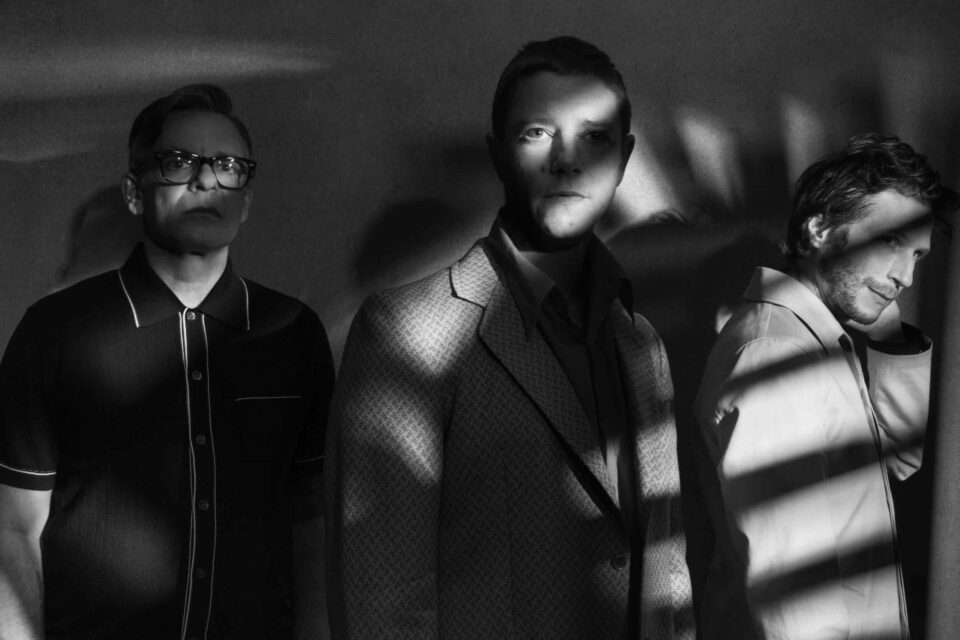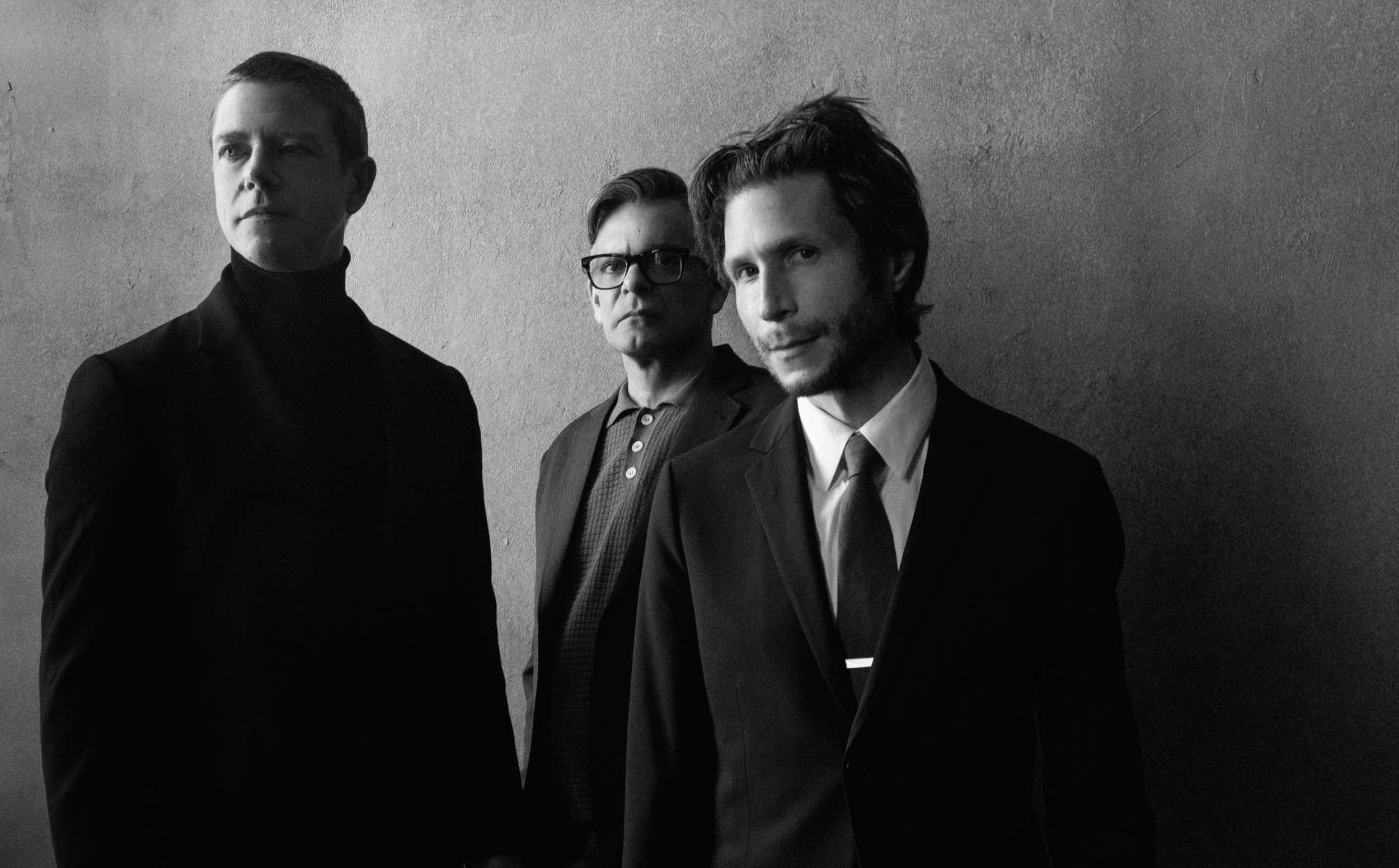Paul Banks realizes you’re tired. As Interpol began writing The Other Side of Make-Believe, the band’s seventh studio album, Banks found it difficult to shake the specter of existential dread: “Society was in peril,” Banks says over a Zoom call. “There was definitely at least a day or two where I think everyone on the planet was like, ‘Wait, is this it? Are we fucked? Are we done?’” Still, he resisted the urge to channel that collective gloom into the band’s latest batch of songs. “‘Everything is fucked’ would be a very dull theme,” he says. “The resilience that the healthcare workers and frontline workers were showing, and the mental fortitude that’s required to not crack up as the world is collapsing…focusing on human durability and resilience was more interesting thematically for me.”
That perspective lends Make-Believe a slightly different hue from the rest of Interpol’s catalog. While fans will recognize all of the band’s most reliable trademarks, Banks points out that songs like “Fables” and “Greenwich” are sunnier in disposition than the median Interpol song, a concentrated attempt to provide escapism. “There’s an uplifting tone to some of it and it’s because I didn’t want to be too glum when the world was so fucked.”
The genesis of Make-Believe can be traced back to the dawn of the pandemic, shortly after Interpol had wrapped their lengthy tour for 2018’s Marauder. The onset of lockdown, says Banks, “wasn’t that disruptive to our writing schedule,” since the band would likely have started exploring new material around this time anyway. “It’s a weird thing to highlight any positives in the course of this pandemic, but at the same time, I think it’s also worth acknowledging when one has blessings,” he said.
“‘Everything is fucked’ would be a very dull theme. The mental fortitude that’s required to not crack up as the world is collapsing…focusing on human durability and resilience was more interesting thematically for me.”
The collaborative process, however, was a thicket of fresh challenges. Typically, Interpol songs are hammered out in the same room, with the band rehearsing together live and toying with different arrangements and approaches in real time. That trial-and-error approach had been essential to the development of every Interpol album up until this point. “[The songs] tend to sound the way they sound because we rehearse together so much,” Banks says. “We will have played the song hundreds of times by the time everything is finished being written, and that’s why I think our albums and performances sound quite precise and tight, because we get super tight while we write the music.”
This time around, isolation forced the band to think differently. “I just was in my room with a bass and a microphone composing basslines at my leisure,” Banks recalls of the circumstances which allowed him to “explore different textures and different vibes.” Rather than competing against the sound of the other instruments, Banks could take his time; he could whisper; he could experiment. “Some of these vocal performances were written this way, of just me sort of hunched over in a bedroom with a microphone, not wanting to project my voice because of neighbors and open windows. So just like a more folk approach, which is very comfortable for me—I write tons of music that way, I just don’t usually write Interpol music that way. And I think it allowed me to explore different types of textures and tonalities with my voice that makes this record feel fresh for us.”

At the start of 2021, the band reconvened in the Catskills; having toiled over demos for the bulk of 2020, they had the rough foundation of a new record. At that point, Banks says, the recording process shifted back to something resembling normalcy. The album was produced by Flood and Alan Moulder; Flood was involved in those initial brainstorming sessions and helped shape the songs during their inception, with Moulder stepping in later on to piece things together during the mixing phase. “There’s a lot of respect and love between them,” Banks says, but their preferences often tugged the band in opposite directions. Moulder prefers clean recordings; Flood, on the other hand, would get his preferred results with the band playing loudly together, which might create eventual technical headaches for Moulder. But their synergy was key to unlocking the album. “Alan has all these things that he would prefer Flood not do, and Flood often defies what he knows Alan would prefer he do, because that’s how Flood gets what he wants. They know that together, through that tension…great results come from that.”
“The band is onstage, the people are in the audience, but something feels different. Like we all had the same dream. There’s this strange sense that everything is the same but we’re all changed in the exact same way.”
Those results reinvigorated the band, which could immediately be heard in the pre-album singles. “‘Fables’ was a song that just wrote itself,” Banks explains. “What Daniel [Kessler]’s chord progression was doing was so propulsive and interesting by itself that I think the bassline takes more of a rhythmic rather than melodic stance. Then there’s only guitars in the choruses and the post-choruses. As I was listening to Daniel’s demo, I was like, ‘This doesn’t need more information,’ just a vocal and Daniel’s guitar. And then Sam [Fogarino] did this crazy beat that has so much bounce to it that I think really makes ‘Fables’ special.”
As the album’s release date approaches, Interpol is preparing to hit the road again. Earlier this summer, the band played their first stretch of shows since the Marauder tour, a surreal experience. “The band is onstage, the people are in the audience, the music is happening, we’re all having a great time, but something feels just different,” Banks says. “Like we all had the same dream. There’s this strange sense that everything is the same but we’re all changed in the exact same way…some sort of collective shared experience is in the air. Like, is this going to last? Are we really here doing these shows, or, what’s going to happen next?”
When the tour does resume, the band will be hitting the road with Spoon, seasoned indie rock vets whose breakthrough moment coincided with Interpol’s. “Those shows are gonna have good mojo of mutual respect and friendship among bands,” Banks says. He’s admired Spoon since he discovered them near the start of his own career, a moment he remembers vividly. “We were in the US touring [Turn on the] Bright Lights. I was asleep in the back of the van, and I think Sam was playing Kill the Moonlight. It was one of those times where you’re in and out of sleep, but somehow your brain can tune into music really well when you’re coming up out of slumber. I remember just really deeply processing that album and thinking, ‘This is all perfect music; everything that’s happening here is so tasteful, it’s incredible.’”
“I do recall working with Carlos and Sam and Daniel [on Turn on the Bright Lights] and feeling like, ‘Man, these guys are crazy fucking talented,’ and I was very awe-inspired by what we were doing.”
Mere days before Interpol embark on that tour, their landmark 2002 debut will reach its 20th anniversary. It’s a surreal milestone for Banks who, at the time, sensed something special was in the air but had little sense of just how momentous the album would prove to be. “I didn’t dare to have any assumptions. But I do recall working with [former bassist Carlos D.] and Sam and Daniel and feeling like, ‘Man, these guys are crazy fucking talented,’ and I was very awe-inspired by what we were doing. I just was aware that my collaborators were very, very gifted and we had a chance of doing something great.”
The shadow of an album like Bright Lights can be long, a debut so immense that its reputation threatens to swallow up everything that comes after. But Interpol have continued to thrive by trusting their instincts and daring to try new things, never pandering. On The Other Side of Make-Believe, they’re continuing to make Interpol songs, but they’re still scavenging for ways to keep their formula fresh 20 years in. “It’s not like coming up with the packaging for M&M’s, or the special sauce for a pizza, where you can get focus groups and say, ‘We should make whatever they want,’” Banks says. “That’s not how it goes with good music. It’s always been whatever we feel is cool, whatever gets through the filter of each of our individual tastes. Between the three of us, it’s enough just to write something that we all approve of and enjoy and feel inspired by.” FL







